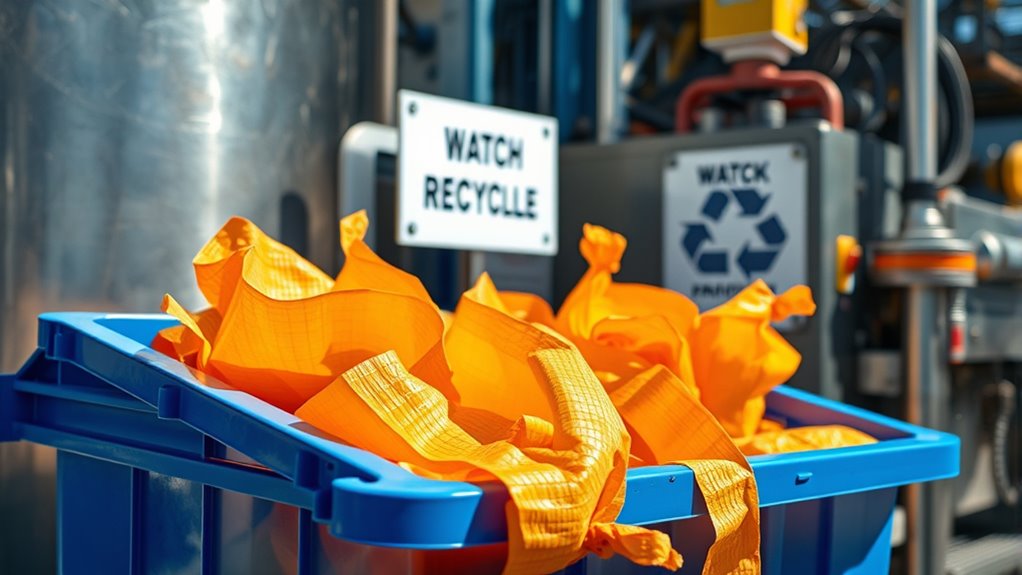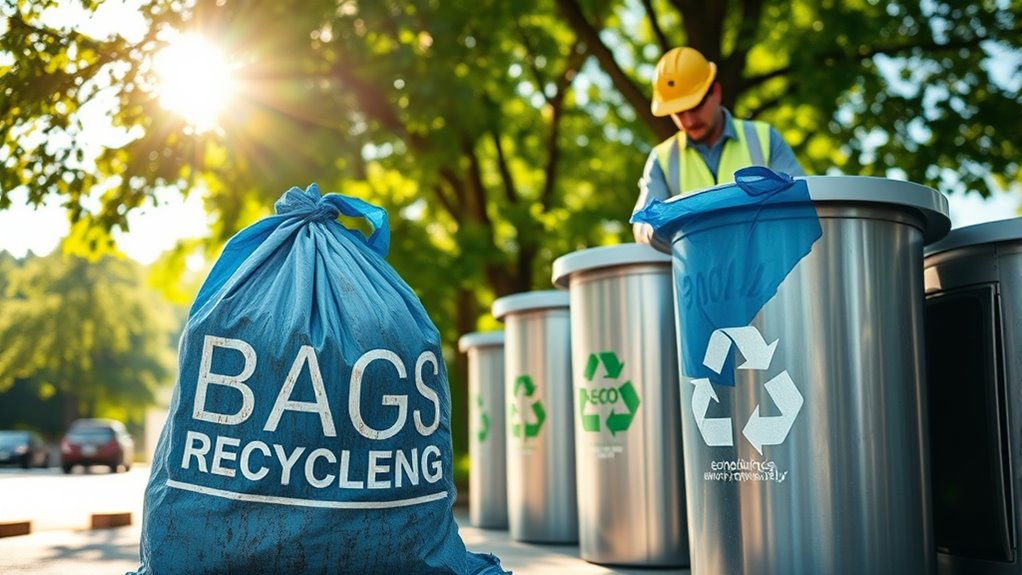To recycle empty dock bags responsibly, start by checking if your local recycling program accepts heavy-duty plastics or similar materials. Properly clean and flatten the bags to prevent contamination and make transportation easier. Consider reusing them for storing tools or securing loose items to extend their life. You can also donate lightly used bags to community organizations. Implementing these eco-friendly practices not only reduces waste but also supports sustainability efforts—things you’ll discover more about as you continue exploring.
Key Takeaways
- Properly identify the material of the dock bags to ensure they are accepted by recycling programs.
- Follow facility guidelines and use designated containers for recycling dock bags to prevent contamination.
- Consider creative reuse options such as tool storage or temporary covers before recycling.
- Educate staff on responsible handling and disposal practices to minimize landfill waste.
- Partner with suppliers offering eco-friendly or reusable dock bags to support sustainable practices.

Recycling empty dock bags is an easy way to reduce waste and support sustainability efforts at your facility. By properly managing these bags, you not only cut down on landfill contributions but also promote sustainable disposal practices. Many dock bags are made from durable materials designed for reuse, so instead of discarding them after a single use, you can find ways to extend their life through innovative reuse. This approach aligns with eco-friendly goals, helping your operation minimize its environmental impact while maintaining efficiency.
Recycling and reusing dock bags supports sustainability and reduces waste in your facility.
To begin, assess the materials your dock bags are made from. Most are constructed from heavy-duty plastics or other recyclable materials. Instead of tossing them out, consider local recycling programs that accept such plastics. Proper disposal through recycling channels ensures that these materials are processed responsibly and can be transformed into new products, reducing the demand for virgin resources. This sustainable disposal method prevents unnecessary waste buildup and encourages a circular economy within your facility.
Beyond recycling, innovative reuse offers additional pathways to maximize the utility of your dock bags. For example, you can repurpose them for other logistical tasks, such as storing tools, securing loose items, or creating temporary covers for equipment. These creative solutions not only prolong the life of the bags but also save money and reduce the need for purchasing new containers. If you have the capacity, you might even explore donating unused or lightly used bags to community organizations or other businesses that can benefit from them, further extending their lifespan and promoting community sustainability efforts.
Implementing a system for the responsible handling of empty dock bags requires some planning. Train your staff on proper disposal and reuse techniques, emphasizing the importance of sustainable disposal practices. Keep clear signage and guidelines near disposal areas to remind everyone of recycling options and innovative reuse ideas. Regular audits of your waste management processes can help identify opportunities for improvement, ensuring that fewer bags end up in landfills and more are diverted for recycling or reuse.
Finally, consider partnering with suppliers who offer eco-friendly or reusable dock bags. Many manufacturers now produce bags designed specifically for multiple uses, making it easier for your facility to adopt sustainable disposal practices without sacrificing operational efficiency. By choosing these options, you demonstrate your commitment to environmental responsibility and set an example for others in your industry. Overall, handling empty dock bags responsibly through recycling and innovative reuse not only benefits the environment but also enhances your facility’s reputation as a sustainability-conscious operation. Incorporating maximizing space and organization strategies can further streamline your storage solutions and support these sustainability efforts.
Frequently Asked Questions
Can Empty Dock Bags Be Recycled at Regular Curbside Programs?
No, you can’t usually recycle empty dock bags at regular curbside programs because of their durability and material composition. Instead, consider alternative disposal methods like repurposing them around your home or checking with local recycling centers for special programs. These bags are designed for durability, so they often aren’t accepted in curbside recycling. Always verify with your local waste authority to find the best way to dispose of or recycle dock bags responsibly.
What Materials Are Most Common in Dock Bags for Recycling?
Did you know that over 300 million tons of plastic waste are produced globally each year? Most dock bags are made from durable plastics like polypropylene or polyethylene, which are the most common recycling materials. They often contain metal components, such as buckles or zippers, that require separate recycling. By understanding these materials, you can better sort and recycle your dock bags responsibly, helping reduce environmental impact and promote sustainability.
Are There Any Health Risks in Handling Used Dock Bags?
Handling used dock bags can pose health hazards if you’re not cautious. You might come into contact with residual chemicals or contaminants, which could cause skin irritation or respiratory issues. To stay safe, follow handling precautions like wearing gloves and masks, washing your hands afterward, and avoiding direct contact with the bags’ contents. These simple steps help protect you from potential health risks associated with handling used dock bags.
How Long Does It Take for Dock Bags to Decompose Naturally?
Ever wondered how long it takes for dock bags to biodegrade? Typically, they can take several years to fully decompose naturally, depending on environmental conditions. The biodegradation timeline varies, but composting benefits considerably accelerate this process by creating ideal conditions for breakdown. By composting dock bags, you help reduce waste and support sustainability. Isn’t it worth investing in eco-friendly disposal methods to protect our planet?
Can Recycling Dock Bags Reduce Overall Environmental Impact?
Yes, recycling dock bags can considerably reduce your environmental impact. By reusing materials, you help cut down on industrial waste and minimize landfill buildup. When you recycle, you prevent harmful substances from polluting the environment and promote sustainable material reuse. This responsible action supports eco-friendly practices, conserving resources and reducing the need for new raw materials. So, by recycling dock bags, you’re actively contributing to a healthier planet.
Conclusion
By recycling your empty dock bags, you protect the environment, reduce waste, and set a responsible example. You conserve resources, prevent pollution, and give new life to what once was discarded. Every bag you recycle becomes a step forward, a ripple in the pond of sustainability, a promise to future generations. So, take action today—recycle with purpose, reuse with pride, and imagine a cleaner, greener world unfolding before your eyes.









